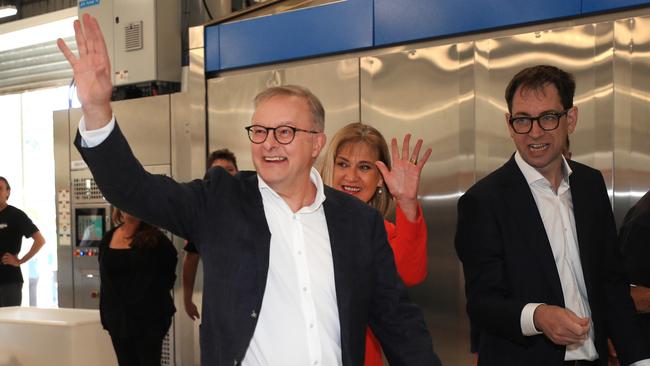
This is core Labor. Big government and radical change.
But it doesn’t come without a cost. To taxpayers and ultimately energy users.
Albanese’s belief is that there is now no alternative if Australia is to realise its ambitions for sovereign resilience, industrial capacity and geo-strategic projection and if Labor is to make good on its growth strategy.
The justification is that Australia is now in a race with the rest of the world to carve out a place in the future global economy amid a fundament shift in the way countries are restructuring their own economies.
Albanese is now laying down markers for not only the next 12 months, but for its second-term agenda. His underlying premise is that economic security and national security were now more interwoven than ever before.
US President Joe Biden has forced this shift on the rest of the world with his Inflation Reduction Act, designed to pump close to $1 trillion into the US economy once it’s done, primarily into clean energy transformation, with all its global implications.
Europe, the UK, Canada, South Korea and Japan have since followed suit with lesser versions of their own.
To realise a future in which Australia can assert greater sovereign resilience, Albanese believes the state must now be involved at a deeper level.
Albanese says this is a theme that is consistent among other western nations. He rejects that notion of old protectionism. He calls it new competition.
Australia clearly can’t compete at scale with the US or China, but it can by leveraging its natural competitive advantage, he says.
He says landmass is one – vast geographic areas on which to build solar and wind farms at scale. The other is resources such as critical minerals.
Taxpayer underwriting of clean energy and advanced manufacturing will be needed on a colossal scale if Australia is to be protected from falling behind the rest of the world.
This means greater subsidies.
While the ambition is not in disagreement, the Coalition violently contests the approach.
Albanese’s aim is to draw a contrast between opposing economic narratives ahead of the election. His challenge, however, is to thread what at present is an unintelligible collection of ideas and projects into a single theme that voters can grasp.
A key criticism of the government’s Made in Australia future so far is its failure to adequately articulate what it actually means. The same obscurity applies to Labor’s clean energy revolution.
What has been acutely lacking is a clear and well-defined narrative that defines the ambition and translates it into electoral sense.
Albanese’s speech will be an attempt to do just that.
To give some clarity of purpose to what is a deliberately planned economic disruption.
He proposes to do this by creating a new Future Made in Australia Act. What its function will be is unclear, other than to brand a singular approach to policies and projects under almost every portfolio in government.
In one respect, it is an admission that Labor has failed to communicate its big idea.
There is not only an electoral need to better frame Labor’s proposition in the election contest, but a demand from investors greater coherence. And subsidies.
At the heart of this new reality is the involvement of the state as the underwriter, the mitigator of risk.
This involves more government, big government, which is a tough sell when the primary concern remains cost of living.
And Albanese has been clear that the budget won’t involve big cash handouts while inflation is still an issue.
The Prime Minister is conscious of two fundamental challenges – ensuring Australia isn’t left behind in the global transition to decarbonised economies and the need to turn Labor’s solution into a vote winning formula.
But Albanese’s view is that Australia now doesn’t have a choice.




Anthony Albanese’s election proposition is now one that unapologetically gives a greater role to the state in transitioning Australia to a decarbonised economy.